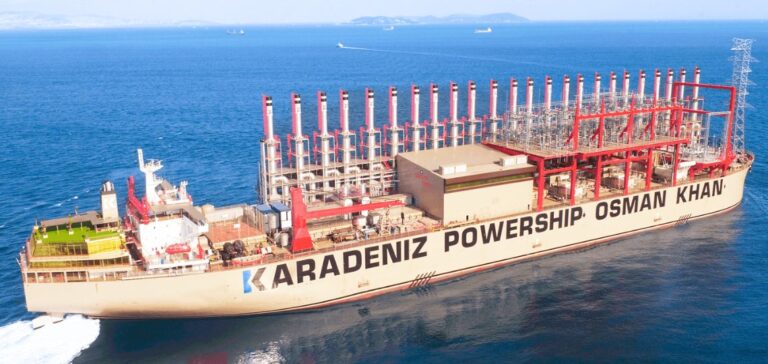Faced with a severe energy crisis, Ecuador is seeking to rapidly diversify its sources of supply.
Overdependence on hydroelectricity has been highlighted by a prolonged drought that has reduced dam water reserves to a bare minimum.
Faced with this situation, the authorities are testing a 100-megawatt floating power plant, a first in the country, to alleviate the power cuts affecting the local economy.
The Vice-Minister of Electricity and Renewable Energies, Rafael Quintero, says this initial test period will last just two days.
The aim is to enter the operational phase quickly, in order to stabilize electricity production and avoid recurring power cuts.
The floating power plant is anchored in Guayaquil, on the Guayas River, a strategic location for electricity distribution.
Technical specifications of the floating power plant
The Karpowership Khan-class floating power plant used in Ecuador is capable of generating between 415 and 470 MW.
This type of vessel is around 300 meters long and 50 meters wide, with a height of 50 meters.
Its shallow anchorage depth of 5 to 7 meters enables rapid installation in ports with suitable marine conditions.
These Powerships are equipped with dual-fuel engines that use low-sulfur fuel oil, natural gas or liquefied natural gas (LNG), offering flexibility in terms of energy sources.
A high-voltage substation is integrated on board, facilitating direct connection to the electrical transmission grid without the need for additional infrastructure on land.
Structural challenges and the need for diversification
Ecuador’s electricity system has been under pressure for months, mainly due to an aging infrastructure unable to meet growing demand.
In April, power cuts of up to 13 hours paralyzed certain regions.
In June, a widespread blackout highlighted the fragility of the network, while human error recently caused outages lasting several hours.
For Rafael Quintero, there is an urgent need to diversify supply sources and strengthen the existing network.
The floating power plant represents a temporary solution to the energy deficit.
In the longer term, modernization of the electricity infrastructure is crucial to guarantee a stable and reliable supply, essential for economic development.
Implications for the energy sector
The arrival of the floating power plant marks a milestone in the Ecuadorian government’s management of its energy crisis.
While the project meets an immediate need, it also raises questions about the country’s long-term energy strategy.
Ecuador may have to reconsider its energy mix, increasing the share of thermal energy sources or other alternatives to better manage the variability of hydroelectricity.
This situation also reflects a broader trend in emerging markets, where flexibility and rapid deployment of energy technologies are becoming crucial criteria.
For operators and investors, the ability to respond rapidly to crises while integrating innovative solutions could become a major asset.
Call for rational energy management
The authorities are also calling on large industries and companies with autonomous production capacities not to rely exclusively on the national grid.
This measure aims to lighten the load on the public power system and enable better management of supply and demand, crucial to avoiding further prolonged blackouts.
Ecuador, while navigating through this period of energy turbulence, is at a crossroads where every energy policy decision could have significant economic implications.
The choices made today will determine not only the stability of the power grid, but also the country’s long-term competitiveness.






















